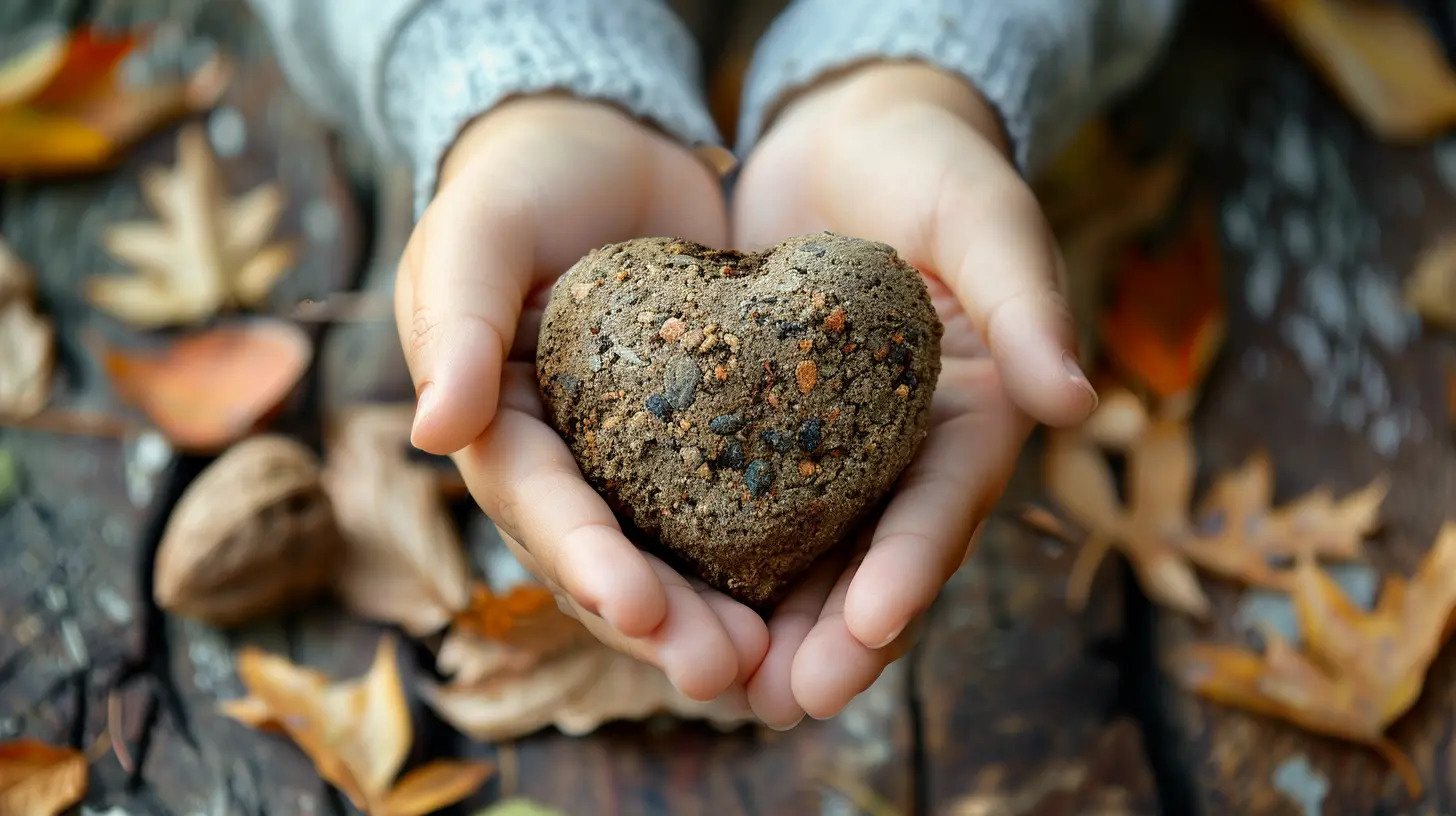Handling Postpartum Emotions with Compassion and Care
9 November 2025
So, you’ve just had a baby. Congratulations! 🎉 Meet your new boss: tiny, loud, demanding, and oh-so-cute. Amid diaper changes, midnight feedings, and trying to remember what a full night’s sleep feels like, there’s a whole gaggle of emotions crashing the party uninvited. Anxiety? Check. Tears for no reason? Check. Guilt because you’re not feeling the way you “should”? Double-check.
Welcome to the emotional rollercoaster known as postpartum. Buckle up—it’s wild, unpredictable, and comes with free samples of hormonal chaos! But fear not, mama (or dad, or partner), because we're here to chat about handling postpartum emotions with compassion and care. Yes, your compassion, your care, and your sanity.
Let’s get real. Let’s get honest. And let’s laugh—because crying is always an option, but laughing burns calories.
Contents
1. What the Heck Are Postpartum Emotions Anyway?2. You're Not Crazy—You're Human (And Sleep-Deprived)
3. Types of Postpartum Feelings: The Moody Mix Plate
4. The Compassion You Deserve—From Yourself
5. The Power of Saying "I'm Not Okay"
6. Partner Power: A Word for the Support Crew
7. Climbing Back to “Normal” (Whatever That Means)
8. When Is It More Than "Just Baby Blues"?
9. Tips to Tame the Emotional Tornado
10. Final Thoughts: You’re Doing Better Than You Think

What the Heck Are Postpartum Emotions Anyway?
Let’s start with the basics. Postpartum emotions are the medley of feelings—good, bad, confusing, and sometimes contradictory—that show up after having a baby. Think of it as a hormonal rave in your brain hosted by estrogen and progesterone with serotonin crying in the corner.You might go from “Oh my goodness, I love my baby so much” to “Why is everyone breathing so loudly?” in 14 seconds flat. Totally normal? Yep. Insanely exhausting? Also yes.
Here’s the thing: bringing new life into the world shifts your entire universe. Your body just did something Olympic-level, and your brain is trying to catch up.
You're Not Crazy—You're Human (And Sleep-Deprived)
Let’s put this myth to bed right now: feeling all over the place postpartum doesn’t make you weak, broken, or unfit. It makes you human. A superhuman, really, considering you’re keeping a tiny human alive while running on crumbs of sleep and coffee fumes.Think of your brain like a messy closet after moving houses. It’s full of old stuff (pre-baby you), new chaos (baby gear, emotions), and a weird mix of guilt, love, and existential dread. Sorting that out takes time, and that’s okay.
Types of Postpartum Feelings: The Moody Mix Plate
Here’s a saucy sampler of what you might feel—and guess what? All of it is normal.1. The Baby Blues
These are the feelings that hit you like a wet diaper a few days after birth. You might cry over a commercial, feel a bit off, or get overwhelmed. Around 70-80% of new moms experience this. The blues usually lift after a couple of weeks.2. Postpartum Depression (PPD)
This isn’t just feeling down. It’s a heavier cloud that sticks around. If you’re disinterested in things you usually enjoy, feeling hopeless, or struggling to bond with your baby past a couple of weeks—get help. Seriously. No shame. There’s strength in asking.3. Anxiety and Intrusive Thoughts
Maybe you're constantly worrying about baby's health, cleanliness, or whether they’re too quiet. If your mind won’t shut up and you feel like you’re on edge 24/7, talk to someone.4. Rage
Betcha didn’t expect this one! Postpartum rage is real. That sudden fury over spilled milk (literally)? You’re not alone.The Compassion You Deserve—From Yourself
Okay, pause. Deep breath. Inhale... exhale... yes, through that spit-up stained shirt. You deserve compassion—first and foremost, from yourself.Would you call your best friend a failure for being emotional after having a baby? Heck no. You’d hand her chocolate, offer a hug, and tell her she’s doing amazing. So why are you treating yourself like you stole the last cookie?
Show up for yourself like you would for someone you love. Self-compassion isn’t a luxury—it’s a necessity.
The Power of Saying "I'm Not Okay"
Here’s a revolutionary idea: it’s okay to not be okay. Shocking, right?Silently suffering in superhero-mode helps no one. Speak up. Tell your partner or your mom or your dog (okay maybe not the dog, unless they’re licensed). Postpartum emotions are not a secret battle you're required to fight alone in a dark room with a burp cloth shield.
You don’t have to be anyone’s idea of the “perfect mom.” Just be the real one. The one who knows when to ask for help.
Partner Power: A Word for the Support Crew
Hey partners, dads, friends, and loved ones—this one’s for you. Your person just made a human. So if they cry because the toast is too toasty, hug them. Don’t fix. Don’t judge. Just be there. Ask “How can I support you?” and actually listen to the answer.Repeat after me: “You’re not crazy. You just did something superhuman. How can I help you heal?”
Support isn’t about doing big things—sometimes it’s just emptying the dishwasher without being asked.
Climbing Back to “Normal” (Whatever That Means)
Spoiler alert: there’s no going back to “normal.” Postpartum life is not about returning to who you were—it's about walking toward who you’re becoming.It won't always suck. The fog will lift. Eventually, you'll sleep again (promise). You'll laugh without leaking (probably). You'll find your rhythm, your tribe, and even time to pee alone. Glorious times await.
Healing isn’t linear. Some days you’ll feel like Beyoncé. Other days you’ll resemble a confused garden slug. Both days are valid.
When Is It More Than "Just Baby Blues"?
You know your gut—that voice inside your head that whispers when something’s off? Listen to her. If your blues don’t fade after two weeks, or your anxiety turns into full-blown panic attacks or rage become your middle name—reach out.Signs it's time to call in reinforcements:
- You feel disconnected from your baby or yourself.
- You’re having frequent, dark thoughts.
- You’re overwhelmed all the time.
- You can’t sleep or eat—even when given the chance.
- You feel like a failure even when everything’s fine.
Mental health check-ups should be a standard part of postpartum care—not a secret bonus level.
Tips to Tame the Emotional Tornado
Here comes the helpful stuff you've been waiting for.1. Sleep Like It’s Your Job
We know. Ha ha ha. But seriously—nap when you can. Enlist help. Sleep deprivation is like setting your soul on fire and expecting yourself to function. It's okay to prioritize rest.2. Fuel Your Body With Real Food
Coffee and Goldfish crackers? Delicious. But let’s sprinkle in some fruits, veggies, and protein so your hormones have the tools to chill out.3. Talk It Out
Therapy. Support groups. Journaling. Ranting in the shower. Whatever works—just get those thoughts out of your head.4. Move a Little
We’re not talking boot camp. A walk around the block while baby naps in the stroller can work wonders.5. Create a "Feel-Good" Toolbox
Build a stash of things that make you smile: a favorite playlist, your best friend's meme drops, cozy socks, or those rom-coms that require tissues and chocolate.6. Say No More Often
You just birthed a human. You don’t need to attend Karen’s baby shower or respond to every text. Create boundaries like your life depends on it—because your peace definitely does.Final Thoughts: You’re Doing Better Than You Think
Here’s the ugly-beautiful truth: postpartum emotions are real, raw, and sometimes rage-y. But they’re also part of a transformative, powerful, and messy journey. Whether you're weeping into your breast pad or yelling into the void, you’re not alone. You’re not broken.You’re just a human doing something extraordinary.
So next time you feel like you’re unraveling, picture this article giving you a virtual hug and whispering, “You’ve got this.” (Also, take that shower. You’ll feel better.
all images in this post were generated using AI tools
Category:
MotherhoodAuthor:

Zelda Gill
Discussion
rate this article
1 comments
Edith Sheppard
Who knew parenting came with a side of rollercoaster emotions? Buckle up and enjoy the ride!
November 10, 2025 at 6:03 AM

Zelda Gill
Absolutely! Parenting is a wild journey of ups and downs—embracing the ride with compassion makes it all the more meaningful.


